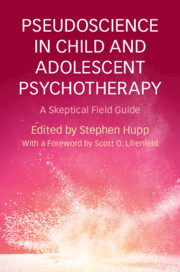Book contents
- Pseudoscience in Child and Adolescent Psychotherapy
- Pseudoscience in Child and Adolescent Psychotherapy
- Copyright page
- Dedication
- Contents
- Sidebars
- Contributors
- Foreword
- Preface
- Acknowledgments
- 1 Critical Thinking about Psychotherapy
- 2 Intellectual and Adaptive Functioning
- 3 Autism Spectrum
- 4 Inattention and Hyperactivity
- 5 Learning
- 6 Tics
- 7 Psychosis
- 8 Bipolar Spectrum
- 9 Depression
- 10 Anxiety
- 11 Obsessions and Compulsions
- 12 Trauma and Attachment
- 13 Feeding
- 14 Eating
- 15 Toileting
- 16 Sleep
- 17 Disruptive Behavior and Conduct
- 18 Substance Use
- 19 Skepticism and Psychotherapy
- Index
- References
19 - Skepticism and Psychotherapy
Published online by Cambridge University Press: 15 February 2019
- Pseudoscience in Child and Adolescent Psychotherapy
- Pseudoscience in Child and Adolescent Psychotherapy
- Copyright page
- Dedication
- Contents
- Sidebars
- Contributors
- Foreword
- Preface
- Acknowledgments
- 1 Critical Thinking about Psychotherapy
- 2 Intellectual and Adaptive Functioning
- 3 Autism Spectrum
- 4 Inattention and Hyperactivity
- 5 Learning
- 6 Tics
- 7 Psychosis
- 8 Bipolar Spectrum
- 9 Depression
- 10 Anxiety
- 11 Obsessions and Compulsions
- 12 Trauma and Attachment
- 13 Feeding
- 14 Eating
- 15 Toileting
- 16 Sleep
- 17 Disruptive Behavior and Conduct
- 18 Substance Use
- 19 Skepticism and Psychotherapy
- Index
- References
- Type
- Chapter
- Information
- Pseudoscience in Child and Adolescent PsychotherapyA Skeptical Field Guide, pp. 291 - 301Publisher: Cambridge University PressPrint publication year: 2019



